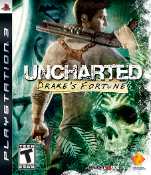I felt like crushing was tougher on this than in number 2. Maybe I just wasn't as good at playing Uncharted at the time. I wonder if it'd be easier, now that I've platinumed number 2, but I'll never know, since 3 is so close to here.
Uncharted: Drake's Fortune Review Rewind
|
|
See PixlBit's Review Policies

On 10/31/2011 at 12:00 PM by Nick DiMola It's a bit tough to play after Among Thieves, but it still proves enjoyable overall. |

Even if you started with 2, give this one a rent and catch up on what you missed – it's absolutely worth your time.
When I first started playing Uncharted: Drake's Fortune, Jesse Miller asked me if the game still held up after playing Uncharted 2: Among Thieves. At the time, I confidently told him "yes," but if you don't mind Jesse, I'd like to retract my response.

The beginning of the game set the stage for another epic adventure, similar to what I had experienced in the first game. Excellent voice acting, emotive characters, beautiful landscapes, and an intriguing tale focused around retrieving a lost treasure shortly after a member of your crew is murdered. What more could I ask for? I hadn't had a thrill like this since the first game. It's the equivalent of a popcorn flick like Indiana Jones. High energy, big action, and a distinct air of discovery -- except here you're in control.
Unfortunately, Uncharted just couldn't maintain the pacing, devolving into a slew of cover-based firefights with very little diversity. Even the enemies remained mostly the same throughout the game, with only three distinct sets, two of which varied very little from one another.

The sad part is that Uncharted isn't actually a bad game. Had I played it before its sequel, there's little question that I would've enjoyed it much more. As a matter of fact, one of its biggest draws – the cinematic presentation – lost its initial wow factor for this exact reason. As a rule of thumb, everything Uncharted does is done better in Uncharted 2.
What sets the two apart is mostly diversity. That's not to say that Uncharted has none. There are a few exciting deviations from the typical gameplay that stand as the most memorable moments in the game. Taking control of a mounted gun on a fleeing jeep is an intense experience that helps break up the more monotonous tasks. An intricate platforming puzzle that requires following cues on Drake's map is also fun, as is jet-skiing against the current on a rapidly flowing white water river. In the grand scheme of the game these are only momentary distractions.

In the sequel, platforming segments play a much bigger role and were crucial in diversifying the experience beyond "pop 'n' cover third person shooter." You see such segments in Uncharted, which would've been great if the mechanics worked consistently. Over the course of the game I had widely varying levels of success in getting Nate to perform my desired action. It wouldn't be uncharacteristic for him to go careening off a cliff in an effort to hop to the next segment of land. Sometimes he wouldn't grab a ledge, though it seemed like he should. Other times he might even fall through the ground.
This is due primarily to his actions being entirely context sensitive. After pushing the jump button and a direction, the game handles the rest. This works mostly fine in Uncharted 2, but here there's no degree of certainty that everything will work out.

What does prop the game up is the simple fact that the third person shooting segments are engaging as are the vast majority of the intricately designed levels. These mechanics work without a hitch and require a high level of skill. Though at times frustrating, most enemies are bullet sponges, which forces you to perfect your headshot. Of course, pulling off constant head shots is extremely redeeming, which makes it easy to overlook the game's shortcomings.
This is all flushed down the toilet at the end of the game, however, when the story takes a bizarre twist. It's not clear why Naughty Dog has built this unreal twist into both of the Uncharted titles, but it's hard to suspend disbelief to accommodate these ridiculous twists. It doesn't help that this segment, like the twist in Uncharted 2, is the least enjoyable portion of the game. The enemies become a chore to defeat and the slow-but-steady aiming mechanics don't work great in conjunction with their fast movements.
I'm glad I played Uncharted: Drake's Fortune, as it has given me some great perspective on just how far the series has come with the release of Among Thieves. It only amplifies my excitement for Uncharted 3 and pushes me to revisit the sequel in preparation for 3. Of course, it's also great to be fully versed in the series and when it comes down to it, it was a decent, lighthearted romp through a beautiful world with a group of interesting characters.










Comments